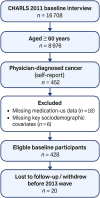Polypharmacy, drug-drug interactions and adverse drug reactions in older Chinese cancer patients: evidence from CHARLS
- PMID: 40510418
- PMCID: PMC12158949
- DOI: 10.3389/fphar.2025.1579023
Polypharmacy, drug-drug interactions and adverse drug reactions in older Chinese cancer patients: evidence from CHARLS
Abstract
Objective: To (i) quantify the prevalence of polypharmacy and clinically significant DDIs, (ii) examine their independent and combined associations with ADRs, and (iii) explore whether depression and cognition modify these relationships among older Chinese adults with cancer among older Chinese adults diagnosed with cancer. A total of 408 participants aged ≥60 years completed both the 2011 baseline and 2013 follow-up surveys, forming the analytic cohort.
Methods: This analysis used data from the China Health and Retirement Longitudinal Study (CHARLS; 2011-2013). Eligible participants were community-dwelling adults aged ≥60 years who answered "yes" to the CHARLS question "Has a doctor ever told you that you had a malignant tumour or cancer?" (variable DAOO7-4, mapped to ICD-10 C00-C97). The most frequently reported sites were lung, stomach, colorectal, liver and breast cancers, yielding an analytic cohort of 408 individuals. Polypharmacy (≥5 medications/day) was determined through face-to-face interviews, and DDIs were identified using standardized reference compendia. ADRs were confirmed by self-reports corroborated with medical records. Depression and cognition were measured using validated scales. Logistic regression models adjusted for sociodemographic and clinical factors were used to evaluate associations.
Results: At baseline, 36.0% of participants reported polypharmacy, rising to 38.0% at follow-up. Clinically significant DDIs increased from 20.1% to 23.0%, while ADRs grew from 6.9% to 8.1%. In adjusted models, both polypharmacy (OR = 2.21, 95% CI = 1.14-4.30) and DDIs (OR = 3.28, 95% CI = 1.54-6.99) independently heightened ADR risk. Elevated depression scores were also linked to increased odds of ADRs, particularly among older women.
Conclusion: Polypharmacy and DDIs substantially magnify the risk of ADRs in older Chinese adults with cancer, with depression further compounding vulnerability. Targeted medication management, careful DDI monitoring, and attention to psychosocial well-being may reduce preventable harms and improve outcomes in this rapidly expanding geriatric oncology population.
Keywords: adverse drug reactions; drug-drug interactions; geriatric oncology; medication safety; pharmacological interactions; polypharmacy.
Copyright © 2025 Yan, Fan, Yu, Su, Zou and Xia.
Conflict of interest statement
The authors declare that the research was conducted in the absence of any commercial or financial relationships that could be construed as a potential conflict of interest.
Similar articles
-
Adverse drug reactions and associated patient characteristics in older community-dwelling adults: a 6-year prospective cohort study.Br J Gen Pract. 2023 Feb 23;73(728):e211-e219. doi: 10.3399/BJGP.2022.0181. Print 2023 Mar. Br J Gen Pract. 2023. PMID: 36823047 Free PMC article.
-
Polypharmacy, drug-drug interactions, and adverse drug reactions among systemic sclerosis patients: A cross-sectional risk factor study.Semin Arthritis Rheum. 2024 Aug;67:152469. doi: 10.1016/j.semarthrit.2024.152469. Epub 2024 May 20. Semin Arthritis Rheum. 2024. PMID: 38781783
-
Drug-drug interactions in a geriatric outpatient cohort: prevalence and relevance.Drugs Aging. 2008;25(4):343-55. doi: 10.2165/00002512-200825040-00007. Drugs Aging. 2008. PMID: 18361544
-
Drug-drug interactions and adverse drug reactions in polypharmacy among older adults: an integrative review.Rev Lat Am Enfermagem. 2016 Sep 1;24:e2800. doi: 10.1590/1518-8345.1316.2800. Rev Lat Am Enfermagem. 2016. PMID: 27598380 Free PMC article. Review.
-
Folic acid supplementation and malaria susceptibility and severity among people taking antifolate antimalarial drugs in endemic areas.Cochrane Database Syst Rev. 2022 Feb 1;2(2022):CD014217. doi: 10.1002/14651858.CD014217. Cochrane Database Syst Rev. 2022. PMID: 36321557 Free PMC article.
References
-
- Bandidwattanawong C., Rattanaserikulchai P., Jetsadavanit N. (2023). Polypharmacy and potentially-inappropriate medications are prevalent in the elderly cancer patients receiving systemic cancer therapy and they co-relate with adverse outcomes. BMC Geriatr. 23 (1), 775. 10.1186/s12877-023-04471-3 - DOI - PMC - PubMed
-
- Berger A. S., Pearce M., Matos L., Alibhai S. (2022). Comorbidity and polypharmacy in older adults with cancer and frailty[M]//Frailty in older adults with cancer. Cham: Springer International Publishing, 93–112.
LinkOut - more resources
Full Text Sources
Research Materials


